The southwestern corner of Virginia has been experiencing a drought that's run on since early September. And once the smallmouth fishing slowed in October and trout fishing would have theoretically taken over, streamflows bottomed out. So, for lack of ideal opportunity, I’ve yielded to my duties to academics, to my freshmen residents, and to writing, disheartened by the environmental condition, and chivalrous towards the fish in their stressed state.
It's been a while. The better part of a month has passed since I've strung up my four weight and felt the chill of mountain water and the slime of a wild trout on my hands. A sharp contrast to my summer's industry, fishing darn near every day, pausing to hear what carries me in the mountains, and fulfilling passion as often. Despite the weight of final exams mashing pedal to metal and the oncoming roller coaster of the holiday season, time has slowed to a crawl, like the flat, meandering trudge of the South Fork of the Holston creeping through defoliating hollows. I’ve grown less tolerant of daily disturbances. Life, through my eyes, is less rich without the regular return to nature.
In these periods of real-time inspirational drought, I dive into reflection, focus on a memorable or defining moment, and celebrate it. For what means bounty without shortage?
But such a hiatus constitutes an emergency, and I have to tend to it, regardless of reward. After all, what means a singing stream without the whisper of drought?
The water is cold, despite its level, as I slosh my way upstream through the familiar vein that slices through thousands of acres of national forest land. The sun pulls the barren forms of hardwoods over its face. My mind expands into the hills and then sounds inward like the rapidly branching plot of a soul-striking novel.
The usual riffles and runs are choked, empty and exposed, but the deeper holes retain promise. A small black stonefly nymph dropped quietly at the head of a large aqueous bowl rouses the spirit of a wild rainbow typical of this stream.
Mine is roused, too. It’s been a while.
In that time, we, the American people, elected a new head of state. There were struggles before him—against the movement for federal land transfer, for action on climate change, for a healthy transition to a more sustainable future—but they were catalyzed by a statesman who believed in such things. The newly elected has made clear his intentions of slamming shut that policy window, with interest in coal and oil over the health of the Earth, favoring impolitic lust for capital over survival. Progress is always hard. Sometimes it’s harder. But what is a movement without opposition? Passion without test?
It is admittedly difficult to maintain hope in light of these events, standing in the stagnant nature of autumn-thus-far in the Southeast. In a puddle of a river once coursing. In 70 degrees in November. In a drought egged on by the hottest summer on record. Watching the fall brown trout season evaporate and the potential of my favorite season squandered. Such stressors even the river can’t save me from, and so my stimulus-starved mind rages, hungry for action. I could give up. But I can’t.
It’ll be a while—that much I’m sure of.
Winter, probably, before the return of seasonal rainfall, and the restoration of healthy streamflows.
Four years, at least, before the majority of representative government stands faithfully on the side of the Earth and the rivers and streams that support the sporting lifestyle we live.
The water will rise, once again, and the fishing, the writing, the fighting will be easier. But integrity keeps on when the going gets tough. So in the meantime, I’ll be at the river, persisting, waiting. For what means victory without struggle?

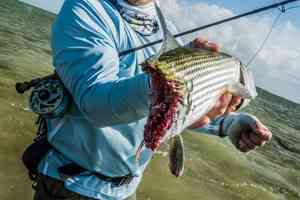




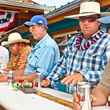
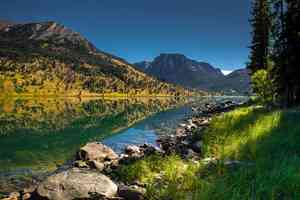


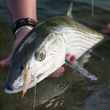
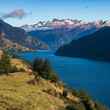
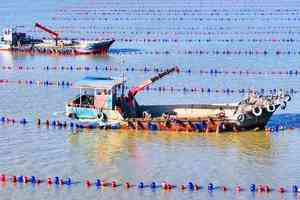


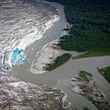
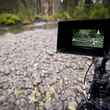








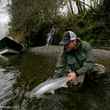

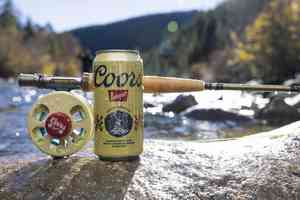

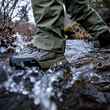
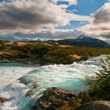
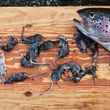
Comments
Scott Mantua replied on Permalink
Matt, Thank you for mirroring my sentiments about this fall. It's refreshing to see someone near my age posting a well written piece on one of my favorite sites. If you ever want to make a trip up to the Lehigh Gorge area find me on FB and you're welcome to stay.
Matthew Reilly replied on Permalink
Scott,
Thanks for your comment. It's been a tough one, hasn't it? There have been others like it, but that doesn't subtract from the implications. My story-telling mind might be just slightly thankful for regular events of extreme weather such as this to remind us of what the future may look like, to keep a critical eye on weather patterns. I'm very familiar with New England. I know some fish up there. Maybe we'll run into each other on the water one day.
All the best
Bob Miller replied on Permalink
Please don't blame Trump for things that have not happened. Your background ought to be sufficient to act as a brake on your emotion. Put blame where it belongs only if and when it happen. Mind sets like yours add nothing to solutions but lead to further distrust, division and doubt about a better future. You are a terrific writer.
Matthew Reilly replied on Permalink
Bob,
I'll first say that no one can place blame on the man for any specific consequence, as he has yet to take office or make any executive decision. What he has done is give rise to and validate a national climate-change-denying rhetoric that is unfounded, embarrassing, and destructive, and that will effectively stall any environmental progress. What we can do is hope that his ever-swaying political direction lands on a route that will further our national quest for a sustainable future, and I am as hopeful as you are that he will succeed in that. Thanks for the comment.
All the best
Pages